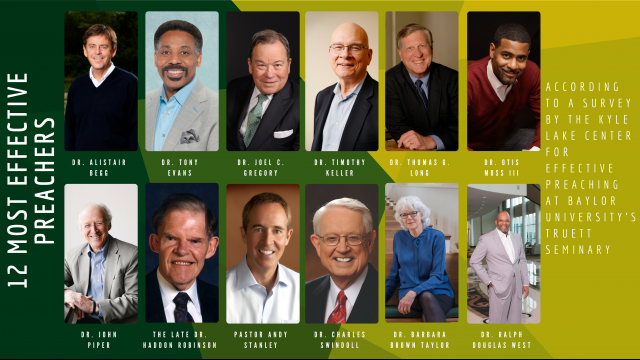These probably aren't the most effective preachers in the English-speaking world – and anyway, so what?
Now we know: these are the 12 most effective preachers in the English-speaking world.
That's according to a survey at Baylor University's Truett Seminary, whose ambition, at least, no one can fault. It might be thought rather strange that from the millions of Christian preachers in hundreds of thousands of churches, the 12 very best all happen to be American (Alistair Begg, who no doubt rejoices in being named to the topmost slot – the best of the best – is a Scot by birth, though he's now a US citizen). It's also a little odd that only one of them – Dr Barbara Brown Taylor, an Episcopal priest – is female. It's just plain bizarre that fully nine of them are white. They include, if you're interested, Tim Keller, John Piper, Andy Stanley and Charles Swindoll.

The seminary's list has, entirely rightly, been widely trashed already on social media – and if they have any sense and an ounce of humility, the recipients of this dubious honour will join in the fun and laugh at themselves. It's impossible to see this enterprise – a re-run of a similar exercise in 1996 – as anything other than a bit of colossally misguided overreach on the part of people with a self-awareness bypass.
According to @Baylor those who can 'really preach' are mostly old white men. Really? Let's expand that list. @Sarcasticluther @paulargooder @AliceGoodman17 @HannahCleugh @MirandaTHolmes @RevRachelMann @annamatthews08 @RuthxJackson @maggidawn @_AlexandraLil https://t.co/W4XYIQGm6l
— Ayla Lepine (@heartchitecture) May 3, 2018
Preaching
Just by the way, it doesn't take a genius to work out the flaws in their methodology. If two US bodies – the Evangelical Homiletics Society and the Academy of Homiletics – get to pick the winners, it's not surprising the rest of the English-speaking world is sidelined. It's not nationalism, it's just that they speak the same preaching language. And if a sermon is judged to be 'good' by certain criteria, it all depends on who sets the criteria – and any list that doesn't allow for the action of the Spirit of God (as this one doesn't) is going to be pretty meaningless. It's rather suspicious, too, that all the winners are 'names', with high public profiles. Is the reasoning that anyone who's any good at preaching will naturally become famous? Hardly a very sound line of reasoning, if so.
But there are, of course, much better reasons for cheerfully ridiculing this whole business, and here are four.
1. Preaching is not competitive
It is far more serious than that. It certainly involves craft, but preachers are not just craftspeople. They open themselves to be channels of the grace of God to their people. Trying to decide who is 'better' at it is fundamentally inappropriate. It's judging not just someone's output, but their whole life before God. It should not be done.
2. The hearer is as important as the preacher
I have heard recordings of sermons by some of the preachers on that list. I assure the good homiletics professors who voted for them that I know plenty of churches where they would sink without trace, their finely-honed sermons heard politely or incredulously. The match just wouldn't be right – illustrating just how false those 'good' and 'bad' categories are.
3. God is more important than either
Every one of those good voters would know the story of how CH Spurgeon came to faith, but it's extraordinary how the lesson has never sunk in. Here it is again. The young Spurgeon, depressed and doubting, found his way in a snowstorm to a small chapel where the preacher hadn't turned up, leaving it to one of the congregation to fill in. He preached on 'Look unto me and be saved, all the ends of the earth', and Spurgeon recalled that he couldn't do much except keep repeating the text. But: 'Now I can never tell you how it was, but I no sooner saw whom I was to believe than I also understood what it was to believe, and I did believe in one moment.' Which preacher wouldn't give all they had to be able to preach a sermon as bad as that, with such a result?
4. Jesus wouldn't like it
When James and John asked him for the places of honour at his right hand and his left, he rebuked them (Mark 10:35-45). That is just not what it's about. We are taught – clearly, repeatedly, patiently and unequivocally – not to play the world's game of competition and heirarchy. It's a lesson that clearly some people still need to learn.
I have been present in small chapels where the most powerful sermons have been given by bad preachers. Sometimes, by the grace of God, I have delivered a terrible sermon myself and had someone tell me afterwards how much it had meant to them. Yes, all preachers should strive to do their best, and no doubt we could all do better. But we don't rank ourselves against each other, unless we've completely lost the plot. We match ourselves against the Word of God, wrestling Sunday by Sunday like Jacob, saying 'I will not let you go until you bless me' – and so we become a blessing to others.
Follow Mark Woods on Twitter: @RevMarkWoods











